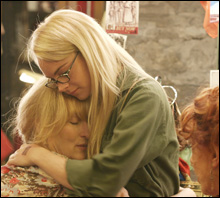|

THE SHOW GOES ON— but it’s not a really great one.
|
I never listened to more than a few minutes of Garrison Keillor’s A Prairie Home Companion. I found it precious, pontificating, sentimental, and self-consciously strange. These are also qualities that Robert Altman can revert to in moments of weakness, and such moments have proliferated of late. Since his last great film, Short Cuts, in 1993, he’s finally become bland enough to win an Oscar, though only for “Lifetime Achievement.”
Although otherwise unremarkable, Prairie provides a quick summary of some of that achievement, incorporating many of his themes and stylistic traits, in particular his recurrent motif of following the intersecting paths of people in a distinctive setting. As in most of his films from M*A*S*H (1970) to The Company (2003), Altman here turns his camera loose on an institution and uncovers a microcosm of society at large. (Add his vérité style and he’s the fictional counterpart of Frederick Wiseman.)
Unfortunately, Keillor’s radio show doesn’t stack up well with a Korean War front-line surgical hospital, the country-music scene in the 70s, or the sordid snakepit of the film industry itself when it comes to compelling narrative. Rather, the storytelling resembles one of the best scenes in the movie, when Keillor is left stranded with nothing between himself and dead air except endless riffs on a duck-tape commercial. Prairie too can seem a desperate, if sometimes inspired, attempt to fill the time.
Starting with the premise. A Texas corporation has bought up Keillor’s show and the old Minneapolis theater from which it airs. The honchos want to replace it all with a parking lot, and their “ax man” (Tommy Lee Jones) is coming by to pull the plug after the program’s last broadcast.
And so the show goes on, with Keillor (whom I find to be a combination of David Letterman and a Smurf) untidily hosting his potpourri of cornball songs, comedy, and tall tales, attended to by his pregnant assistant, Molly (Maya Rudolph), who is kind of the film’s Radar O’Reilly, while refusing to acknowledge that this show is his last. And it’s not a really great show. The acts include the singing cowboys Dusty and Lefty (Woody Harrelson and John C. Reilly, not raising a sweat), whose “Bad Jokes” lives up to its title; the sister act of Rhonda and Yolanda Johnson (Lily Tomlin and Meryl Streep trying too hard), who reminisce backstage about past heartbreaks and high jinks with strained nostalgia; and Yolanda’s surly daughter Lola (Lindsay Lohan), who reflects on the painlessness of suicide in her poetry and ends up singing an unremarkable “Frankie & Johnny.” I liked best Kevin Kline’s Guy Noir; Kline offers at least one hilarious improvisation, though his voiceover narrative sounds at times like a W.B. Mason commercial.
ADVERTISEMENT
 |
All these people have issues, some less contrived than others, though overriding them all is Death, a/k/a “The Dangerous Woman” (Virginia Madsen), a pale, beautiful specter who prowls the shadows of the theater with less grace than Altman’s camera. “The death of an old man is not a tragedy,” she says when an old man dies, and like much of the rest of the dialogue, it sounds like a platitude. Until it sinks in that for the 81-year-old Altman, this film, or the next one, or the one after, could be his last. If at least one of them is not a triumphant swan song, it would be tragic indeed.